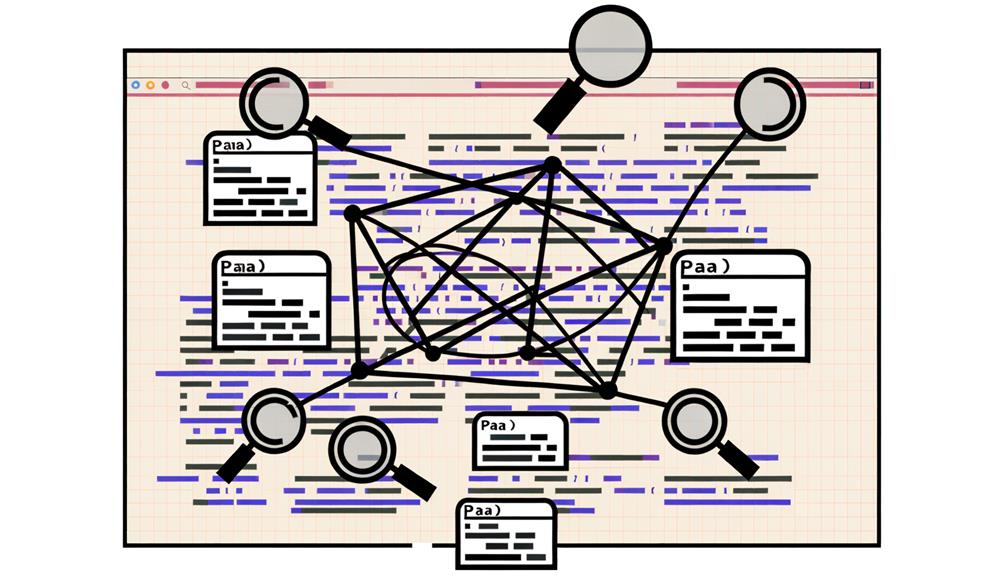You can scrape People Also Ask (PAA) questions from Search Engine Results Pages (SERPs) using Python for SEO purposes. Start by utilizing the Gquestions Python library and Selenium for data extraction. Ensure you comply with ethical guidelines to prevent legal issues. Once scraped, unpack the structured data and analyze the PAA questions for user intent insights. It's crucial to understand the variations in PAA questions for a comprehensive SEO strategy. By moving forward, you'll uncover the nuanced steps and methods to effectively employ this strategy. Keep going, there's much more to learn.
Key Takeaways
- Utilize the Gquestions Python library to scrape PAA questions from SERPs for SEO insights.
- Install required dependencies and add Chromedriver to system's path for Chromium control.
- Use scraping responsibly, adhering to ethical guidelines and Google's Terms of Service.
- Analyze scraped PAA questions systematically for understanding user intent and behavior.
- Explore PAA variations and unpack structured data for effective SEO strategy.
Understanding Gquestions Library
If you're looking to gather relevant questions from Search Engine Results Pages (SERPs) for SEO purposes, Gquestions, a Python library, can be your go-to tool. This library is a powerhouse for data science integration, using selenium for scraping to extract potential PAA (People Also Ask) questions. It's not just about scraping; it's about understanding user intent and making data-driven decisions.
This library utilizes a combination of Selenium, Pandas, Pytz, Numpy, and urllib3, offering a robust framework for data collection. To use it, download and install the necessary dependencies from the GitHub repository. Don't forget to add Chromedriver to your system's Path for Chromium control. In the realm of SEO, understanding and utilizing such tools can be a game-changer. Remember, it's all about blending coding prowess with SEO knowledge.
Importance of PAA Questions in SEO

Delving into the world of SEO, you'll quickly realize the pivotal role that PAA (People Also Ask) questions play in fine-tuning your content strategy and understanding user behavior. These questions provide valuable SEO insights, allowing you to delve deeper into the user intent behind queries. They act as a golden key, unlocking the door to a more nuanced understanding of what your audience is truly seeking. By analyzing the PAA questions related to your content, you can craft highly targeted, user-focused material that hooks your audience and meets their needs. Don't overlook the potential of PAA questions. They're not just an SEO tool, they're a window into the mind of your audience. Harness their power to drive your SEO strategy and deliver real value to your users.
Ethical Guidelines for Scraping

While scraping PAA questions can significantly enhance your SEO strategy, it's crucial to adhere to ethical guidelines and Google's Terms of Service to avoid legal repercussions. You must respect the ethical considerations surrounding the practice, such as respecting privacy, ensuring data accuracy, and not using the data for malicious intent. Unethical scraping can lead to legal implications, including penalties and potential lawsuits. Google strictly prohibits the scraping of its SERPs, so it's important to tread carefully. If you're found to be in violation, you could face severe consequences such as your site being blacklisted. Remember, scraping should be used responsibly, as a tool to enhance user experience and content quality, not as a means to exploit or manipulate data.
Unpacking Structured Data

Now, let's dive into the intricacies of unpacking structured data, a crucial aspect of effectively using PAA questions for SEO. The key lies in systematic extraction and classification of the data. You need to break down the data into manageable chunks for easy analysis. This isn't just about data collection; it's about making sense of it.
Data visualization plays a vital role here. Visuals can quickly reveal patterns and correlations within the data that plain text can't. Use Python libraries like Matplotlib or Seaborn to create clear, meaningful visualizations.
Analyzing PAA Questions

To effectively leverage PAA questions for your SEO strategy, it's essential to conduct a thorough and systematic analysis of these queries. Start by examining the structure and pattern of the questions, trying to understand the underlying user behavior. What are users asking? What information are they seeking?
Next, conduct a sentiment analysis. Are the questions based on positive, neutral, or negative sentiments? This can offer valuable insights into user perception and attitude towards a particular topic.
Remember to not just focus on the questions themselves, but also on the answers provided. Analyzing these can help you tailor your content to not just answer the questions, but also provide additional useful information that users might not have thought of asking.
SEO Enhancement With PAA Questions

Often, you can significantly enhance your SEO strategy by effectively utilizing PAA questions. These questions can provide key insights into user intent, giving you a better understanding of what your audience is looking for. By incorporating these insights into your content strategy, you're able to create more targeted, relevant content that meets your audience's needs and boosts your site's SEO performance.
You can use Python to scrape PAA questions from SERPs, providing a wealth of data for your SEO strategy. This data not only helps you to understand your audience's intent but also allows you to tailor your content to better meet this intent. Remember, understanding and meeting user intent is critical to SEO success. So, get scraping and enhance your SEO strategy today!
Exploring PAA Variations

Delving into PAA variations opens up a wealth of opportunities for your SEO strategy, allowing you to explore multiple angles and layers of user intent and queries. By dissecting PAA variations, you can uncover a diverse range of SEO insights, giving you a competitive edge. Your PAA strategies should include consistent analysis of these variations to understand evolving search trends. You'll notice that different questions often sprout from a single seed query, each representing a unique user intent. Systematically examining these variations can reveal untapped content ideas and keywords. Remember, it's not just about finding more questions, it's about understanding the nuances of user intent encapsulated in these variations. This detailed, methodical approach will ensure your SEO strategy is both dynamic and effective.
Holistic SEO for Success

Embracing a holistic SEO strategy, you need to integrate coding, data science, and branding expertise, creating a comprehensive approach that goes beyond traditional methods. This strategy will enhance your understanding of user intent, ultimately improving your content strategy.
| Holistic SEO | Benefits |
|---|---|
| Coding Skills | Utilize Python libraries like Gquestions |
| Data Science Expertise | Analyze SERP data effectively |
| Branding Knowledge | Tailor content to user intent |
Through data science, you'll analyze SERP data, revealing insights about user intent that can guide your content strategy. Coding skills, especially Python, will be crucial in scraping and handling this data. Meanwhile, branding knowledge will ensure your content aligns with user intent, reinforcing your brand's message while meeting audience needs. By marrying these skills, you'll optimize your SEO strategy for success.
Frequently Asked Questions
What Are the Installation Prerequisites for the Gquestions Library?
Before installing the gquestions library, you'll need to ensure library compatibility. It's crucial to have Python 3.6+ as gquestions doesn't work with older versions. Additionally, you'll need to install dependencies like Selenium, Pandas, Pytz, Numpy, and urllib3. Don't forget to download Chromedriver for controlling Chromium and add it to your system's path. This systematic approach will help you successfully set up gquestions.
How Can PAA Questions Influence Keyword Research in Seo?
You can leverage PAA optimization techniques to enhance your keyword research in SEO. PAA questions help you dive deeper into user intent, thus revealing new keyword opportunities. They offer insights into SEO trends impact on user queries and behavior. By analyzing these questions, you'll understand your audience better, enabling you to create content that's more aligned with their needs. It's a systematic and detailed approach to SEO strategy development.
What Are the Legal Implications of Violating Googles Anti-Scraping Rules?
If you violate Google's anti-scraping rules, you're potentially facing legal consequences. Google can take legal action against you, your site may be penalized or even removed from search results. Ethically, in SEO, scraping should be done responsibly and within the boundaries of the law. It's important to respect Google's guidelines, as well as the privacy and rights of the website owners you're scraping data from.
What Software Can Be Used to Visualize Structured Data From PAA Questions?
Like a painter uses a canvas, you can use data visualization tools to make sense of structured data from PAA questions. Tools such as Tableau, Power BI, and Python's Matplotlib offer rich, interactive visuals. They'll transform your data into a comprehensible format, unveiling patterns and insights that text can't. This not only maximizes structured data benefits but also aids in strategic decision making for your SEO efforts.
How Can Holistic SEO Be Integrated Into a Traditional SEO Strategy?
To integrate holistic SEO into your traditional strategy, understand its benefits. Holistic SEO expands your focus beyond keywords, considering user intent, content quality, and technical aspects. You're not just chasing rankings, you're building an experience. Traditional SEO challenges, like algorithm changes, become less daunting. You're responsive, not reactive. You'll analyze data from all angles, optimize your site's performance, and create content that truly answers your audience's questions. It's a comprehensive approach that'll improve your site's longevity.



